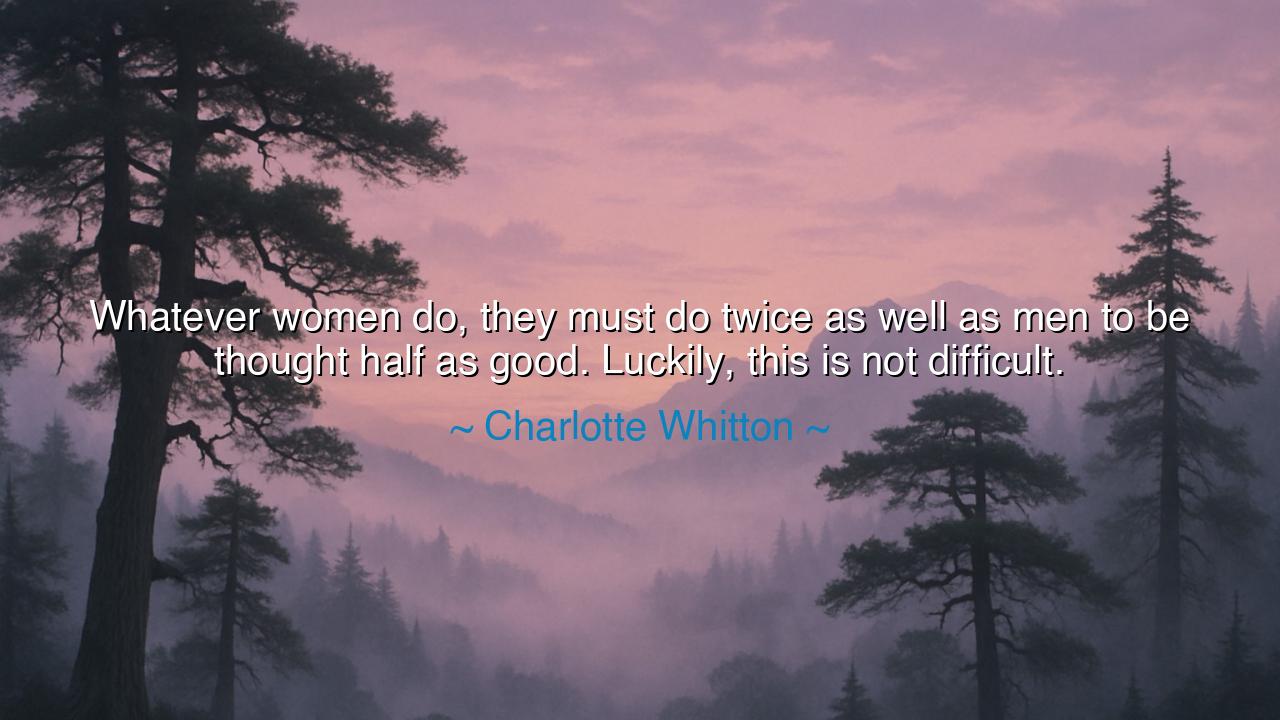
Whatever women do, they must do twice as well as men to be
Whatever women do, they must do twice as well as men to be thought half as good. Luckily, this is not difficult.






"Whatever women do, they must do twice as well as men to be thought half as good. Luckily, this is not difficult." — these words, spoken by the indomitable Charlotte Whitton, resonate with the deep truth of the struggle for equality and recognition that women have faced throughout history. Whitton, herself a pioneering figure in Canadian politics, understood the weight of her words—the undeniable fact that, in many societies, women were held to standards far higher than their male counterparts simply because of their gender. Yet, in the same breath, she offers a statement of empowerment, reminding us that while the burden may be unjust, women have the strength, resilience, and determination to rise above it.
In the ancient world, the role of women was often circumscribed by societal norms, relegated to the home or to secondary roles in public life. The Greeks, with their wisdom and philosophy, believed in the virtues of justice and reason, yet their society was built on the subjugation of women. Aristotle himself wrote that women were "inferior" to men, a view that permeated much of ancient thought. But even in these dark times, there were women who defied these boundaries, women like Sappho, the poetess, whose verses rang through the ages, not because she was granted equality, but because her genius shone despite the societal constraints. Her words and her courage stand as a beacon for all who struggle against oppression—a reminder that talent and brilliance are not bound by gender.
Yet, in every age, women have been told that they must do more, strive harder, and prove themselves to be worthy of even half the recognition that men receive. This is the reality that Whitton speaks of: the unjust demand that women must work twice as hard to be seen as equal. History is replete with women who have achieved greatness, only to have their contributions overlooked or minimized simply because of their gender. Take, for example, Marie Curie, whose groundbreaking work in radiation and chemistry earned her two Nobel Prizes—yet, despite her monumental achievements, she had to fight for respect and recognition in a world dominated by men. Her work laid the foundations for modern medicine and science, but it was not given the reverence it deserved in her lifetime.
Despite these challenges, Whitton’s final words, “Luckily, this is not difficult,” strike a note of defiance and hope. She acknowledges the injustice of the situation, yet she suggests that women possess the very strength and fortitude to meet this challenge head-on. There is an almost playful resilience in her statement—"it is not difficult" because women, through centuries of adversity, have learned to endure, to rise, and to exceed expectations, not in spite of the obstacles, but because of them. Women have long been masters of perseverance, taking what is given to them and transforming it into something greater, something that transcends the limitations placed upon them.
In the life of Harriet Tubman, the enslaved woman who became a heroic conductor of the Underground Railroad, we see this resilience in action. Tubman did not merely escape slavery; she led hundreds of others to freedom, risking her life time and time again. Yet, her bravery and determination were often overshadowed by the fact that she was a woman, and a Black woman at that, in a deeply racist and patriarchal society. But despite the challenges, her legacy is undeniable, and her life stands as a testament to the fact that, when women are pushed to the edge, they do not break—they soar.
The lesson that Whitton imparts is one of empowerment and hope. Yes, the burden of inequality may weigh heavily upon women, but it is not insurmountable. Women have always risen to the occasion, transcending the limitations imposed by society, proving that greatness is not dictated by gender, but by character, dedication, and talent. If the world demands that women do twice as much, then let them do so with grace, strength, and brilliance. The lesson is clear: inequality may be a harsh reality, but it is also an opportunity for women to prove their resilience, to show the world that they are not just equal, but in many ways, superior in their ability to endure and thrive in the face of adversity.
In our own lives, let us remember Whitton’s words and live them out. We may face obstacles, whether because of our gender, race, or any other limitation imposed by society, but let us take those challenges and rise above them. Let us do the work not just to meet the expectations of others, but to set our own standards and goals. Let us not be deterred by the weight of injustice, but instead, let it fuel our determination. For just as women have always overcome adversity, so too can we all become agents of change, showing the world what is possible when we dare to challenge the norms and push beyond what is expected. Greatness is not reserved for those who fit into the mold; it belongs to those who are willing to break it.






AAdministratorAdministrator
Welcome, honored guests. Please leave a comment, we will respond soon